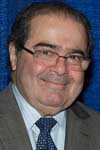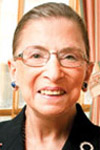In speeches: Scalia says oral arguments are valuable; Ginsburg indicates she's not ready to retire
The friendship between U.S. Supreme Court Justices Antonin Scalia and Ruth Bader Ginsburg is well-established and has even inspired Scalia/Ginsburg, a new opera chronicling the ideological adversaries’ personal relationship. On Tuesday, both justices were in action, giving speeches and holding court in different parts of the country.
Never one to shy away from giving his opinion on controversial topics, Scalia managed to avoid talking about gay rights, health care, civil rights or any of the various issues that have landed him on the front pages of newspapers and websites.

File photo of Justice Antonin Scalia courtesy of ABA Media Services.

File photo of Justice Ruth Bader Ginsburg by Sam Kittner.
In a 20-minute lunchtime gathering at the University of Memphis Cecil C. Humphreys School of Law, Scalia spoke mainly about the role of the judiciary and the efficacy of Supreme Court oral advocacy. According to the Memphis Daily News, Scalia emphasized that oral arguments are important and disagreed with the notion that written briefs matter more. While he stated that he oral arguments have never changed his mind, he did say that they have helped him make up his mind. Scalia also touched on the role of the judiciary, saying that state courts play a much larger role in people’s lives than federal courts and that the Supreme Court should not be influenced by foreign courts.
Most importantly, Scalia argued that the American system of an independent judiciary and decentralized government were fundamental to ensuring freedom. “If you were to ask the average man on the street what has been the greatest source of our freedoms … you would probably get a response (like) freedom of speech. Freedom of the press,” Scalia said. “That is so mistaken. Do you not realize every tyrant in the world has a bill of rights? Every banana republic? … Unless the real constitution of a country prevents the centralization of power, all the rest is words on paper.”
Meanwhile, in Virginia, Ginsburg was the keynote speaker at a Northern Virginia Technology Council event. According to the Washington Post, Ginsburg was paired up with another ideological opponent, Gibson Dunn & Crutcher partner and former U.S. Solicitor General Ted Olson. Unlike Scalia, her speech was more personal as the justice reflected on her career and the various obstacles she had faced as a woman in the legal profession (she also quoted lyrics from Scalia/Ginsburg). “Every year Sandra [Day O’Connor] and I served together, someone would call me Justice O’Connor because they heard a woman’s voice,” said Ginsburg, who noted that it no longer happens now that there are two additional women on the high court.
Ginsburg also addressed calls for her to retire this year so that President Barack Obama can name her successor while Democrats still control the Senate. According to the Huffington Post, Ginsburg said that justices should work for as long as they feel they can and should not manipulate the system so that they get a like-minded justice as their replacements. Ginsburg noted that liberal justices William Brennan and Thurgood Marshall both retired from the court during George H.W. Bush’s tenure. “At my age, you take it year by year. I’m OK this year,” she said.



